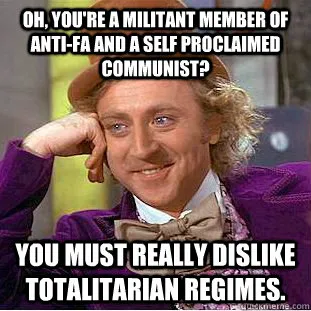
Quickmeme.com
When reading The Road to Serfdom, I truly felt the sincerity of Friedrick Hayek and his argument and warnings, it was those of man who doesn't want history to repeat itself and it shows in his work. As I read through and complete these assignments and works created by others, it is giving me a larger and more educated perspective on socialism and the importance of freedom of enterprise. To be honest, before this class, I thought the idea of democratic socialism was obviously not my first choice, but still a somewhat viable option, but I was severely mistaken. Hayek defined both, while democracy increases freedom and power to people, socialism restricts freedom and limits power to the people. However, the two do not cancel each other out, instead, socialism allows take over, and as a result, corruption ensues. Democratic socialism, is a huge contradiction, and either its modern counterpart means something else or it's hiding in plain sight. Many turn to socialism as a way to guarantee "economic security," as Hayek calls it, but Hayek also mentions a distinction between two forms of economic security. More basic access to security, such as a minimum standard for essentials (food, water, shelter), and security where everyone's security is the same. The second option, in my opinion, isn't fair, people with money work hard for it (excluding inheritance). People will often confuse socialism with attaining the first security, but in reality, it typically means the second. Hayek exerts that freedom is more important than guaranteed security because freedom still gives people the ability to obtain security. Freedom allows for growth, it gives an ample amount of growing room. From this growth, humanity advances and so do countries and societies. Often people think that planning is inevitable to help guide progress, but that isn't true. Hayek addressed the counterarguments to that claim in three ways. The first was monopolies. I don't want any company or person to have complete control, which is totalitarian. But Hayek disproves this idea, by noting that state involvement typically entails the formation of monopoly. Second, competition fosters advancement, but some people believe planning is the only way to advance. However, examples, such as the space race and war, prove the competition theory to be true. Third, people think technology must be protected. But, access to previous technology, allows for the improvement and development of new technology. Essentially, giving people economic freedom of enterprise, the human spirit will advance and take off. Obviously, some economic rules should be in place. These can prevent government tampering, morally corrupt practices, etc. Planning requires a set plan of the future, it requires, as Hayek states, "circumstance." Laws are guides, they are un-subjective, they apply to various circumstances and situations. To summarize, Hayek came from not only a logical perspective but an emotional perspective. It truly gave me more insight into the importance of free enterprise and economic freedom.